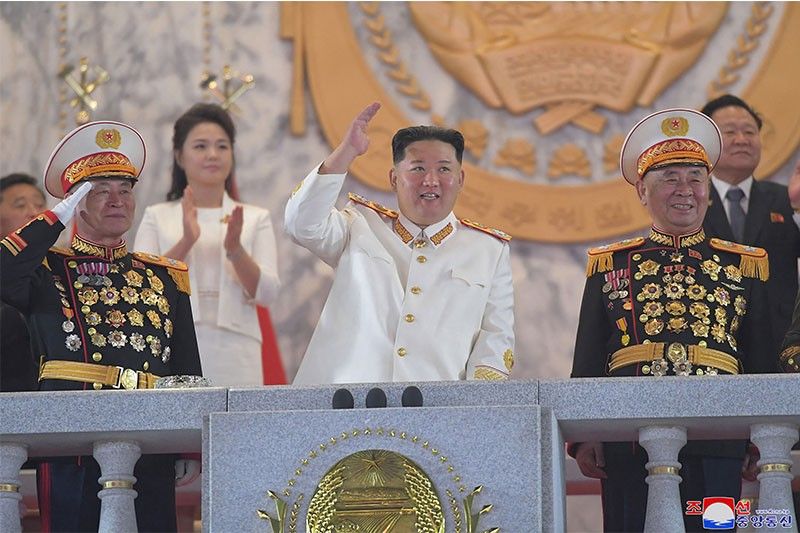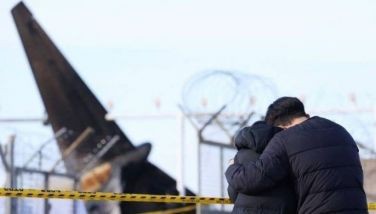At military parade, Kim vows to boost North Korea nuclear arsenal

SEOUL, South Korea — North Korea will rapidly accelerate the development of its nuclear arsenal, leader Kim Jong Un said while overseeing a vast military parade showcasing his most powerful intercontinental ballistic missiles, state media reported Tuesday.
Despite biting sanctions, North Korea has doubled down on Kim's military modernisation drive, test-firing a slew of banned weapons this year while ignoring US offers of talks — as analysts warn of a likely resumption of nuclear tests.
Dressed in a white military uniform trimmed with gold brocade, Kim watched as tanks, rocket launchers and his largest ICBMs were paraded through Pyongyang late Monday for the founding anniversary of North Korea's armed forces, state media reported.
Kim said he would "take measures for further developing the nuclear forces of our state at the fastest possible speed", according to KCTV footage of his speech.
"The nuclear forces, the symbol of our national strength and the core of our military power, should be strengthened in terms of both quality and scale," he said.
Repeated negotiations aimed at convincing Kim to give up his nuclear weapons programmes have come to nothing, and he warned Monday he could use his atomic arsenal if North Korea's "fundamental interests" were threatened.
Warning to Seoul?
North Korea had paused long-range and nuclear tests while Kim met then-US president Donald Trump for a bout of doomed diplomacy, which collapsed in 2019.
Last month Pyongyang test-fired an ICBM at full range for the first time since 2017, and satellite imagery shows signs of activity at a nuclear testing site, which was purportedly demolished in 2018 ahead of the first Trump-Kim summit.
State Department spokesman Ned Price said Tuesday Washington was still "open to engaging in diplomacy and dialogue" on ending the North's nuclear programme.
"But we also have an obligation to address the recent provocations that we've seen from the DPRK including its two recent ICBM launches," he told reporters, referring to the North by its official name, the Democratic People's Republic of Korea.
Kim's messaging on the purpose of his nuclear weapons could be a response to South Korea's new hawkish, conservative President-elect Yoon Suk-yeol, who takes office May 10, analysts said.
"Yoon has threatened a pre-emptive strike on Pyongyang if needed, and Kim seems to be indirectly saying that he may have to respond with nuclear tactics," said Yang Moo-jin, a professor at the University of North Korean Studies.
Kim's uniform with a marshal's star — North Korea's highest military rank — was also a signal for Seoul, said Cheong Seong-chang of the Sejong Institute.
"It symbolises his ultra-strong stance to the incoming Yoon Suk-yeol administration," he said.
Kim's parade speech "suggests that the threshold for North Korea's use of nuclear weapons can be lowered even further", he added.
Nothing new
Columns of goose-stepping soldiers waving flags and carrying weapons marched through a floodlit square, KCTV footage showed, with North Korea's famous news anchor Ri Chun Hi announcing each unit.
Flanked by his generals, Kim smiled, waved and saluted the troops, North Korean jets in formation flew low, and then huge missiles — from short-range ballistic to hypersonic — on transporters were driven through the square.
"This is state-of-the-art equipment with strong striking power that can pre-emptively and thoroughly annihilate any enemy outside of our territory," Ri said in a voiceover.
Footage showed the parade showcasing the Hwasong-17, the country's most advanced ICBM that Pyongyang claims to have successfully tested March 24.
When the Hwasong-17s rolled into the square, Ri said the country was "advancing today with pride after showing off the true value of its absolute power before the world".
State media trumpeted the "miraculous" launch of the nation's most advanced ICBM, publishing dramatic photos and videos of leader Kim personally overseeing the test.
But analysts have identified discrepancies in Pyongyang's account, and South Korean and US intelligence agencies have concluded that North Korea actually fired a Hwasong-15 -- a less-advanced ICBM which it had already tested in 2017.
"For all the hype and months of practice, Monday's North Korean military parade didn't really show many novel capabilities," said Chad O'Carroll of Seoul-based specialist website NK News, adding that "we've seen the vast majority of this two years ago".
North Korea stages military parades to mark important holidays and events. Observers closely monitor these events for clues on Pyongyang's latest weapons development.
As Kim and his wife walked away with the parade ending, KCTV showed a close-up of a spectator weeping, seemingly in joy, as fireworks exploded overhead.
South Korean officials were briefing the White House Thursday on the outcome of their pathfinding meeting with North Korean leader Kim Jong Un.
Seoul has already publicized that North Korea offered talks with the United States on denuclearization and normalizing ties, a potential diplomatic opening after a year of escalating tensions over the North's nuclear and missile tests. The rival Koreas also agreed to hold a leadership summit in late April.
Top Trump administration officials were getting a chance to hear firsthand from South Korean national security director, Chung Eui-yong, who led the delegation that went to Pyongyang. — Associated Press
South Korea's defense ministry says Thursday it was "closely monitoring" a North Korean nuclear reactor site after local media reported its operations had been temporarily suspended, potentially to extract weapons-grade plutonium.
The Donga Ilbo newspaper reports earlier in the day that intelligence sources in Seoul and Washington had detected signs the five-megawatt reactor in Yongbyon had temporarily stopped operations late last month.
The suspension could be an indication that spent fuel rods are being reprocessed to extract plutonium for use in nuclear weapons, the report cited a government source as saying. — AFP
State media reports that North Korea's rubber-stamp legislature has enshrined the country's status as a nuclear weapons power in the constitution.
"The DPRK's nuclear force-building policy has been made permanent as the basic law of the state, which no one is allowed to flout with anything," leader Kim Jong Un said at a meeting of the State People's Assembly that was held Tuesday and Wednesday, the KCNA news agency says.
DPRK is the acronym for the country's formal name. — AFP
State news agency KCNA reports that North Korea announced it had built a "tactical nuclear attack submarine" as part of its effort to strengthen its naval force.
North Korean leader Kim Jong Un presided over the unveiling ceremony on Wednesday, saying the new sub was part of a "push forward with the nuclear weaponization of the Navy in the future", according to KCNA.
The launching of submarine No. 841, named the Hero Kim Kun Ok, "heralded the beginning of a new chapter for bolstering up the naval force of the DPRK", the KCNA report said, referring to the country by the abbreviation of its formal name. — AFP
State-controlled media reports Sunday that North Korea staged a "simulated tactical nuclear attack" drill at the weekend with mock atomic warheads attached to two long-range cruise missiles that were test-fired into the ocean.
The Korean Central News Agency says the operation early Saturday was a "counteraction drill" in response to joint military activity by US and South Korean forces that KCNA said has escalated tensions in the region.
"A firing drill for simulated tactical nuclear attack was conducted at dawn of September 2 to warn the enemies of the actual nuclear war danger," KCNA reports. — AFP
Seoul's military says North Korea fired multiple cruise missiles off its west coast on Saturday, the latest in a string of recent Pyongyang military actions.
The launches come three days after the North launched a pair of short-range ballistic missiles as part of a "tactical nuclear strike drill" prompted by the annual US-South Korean Ulchi Freedom Shield military exercises, which always infuriate the reclusive regime.
Pyongyang views such the drills as a rehearsal for invasion while the two allies say they are defensive in nature. — AFP
- Latest
- Trending
































